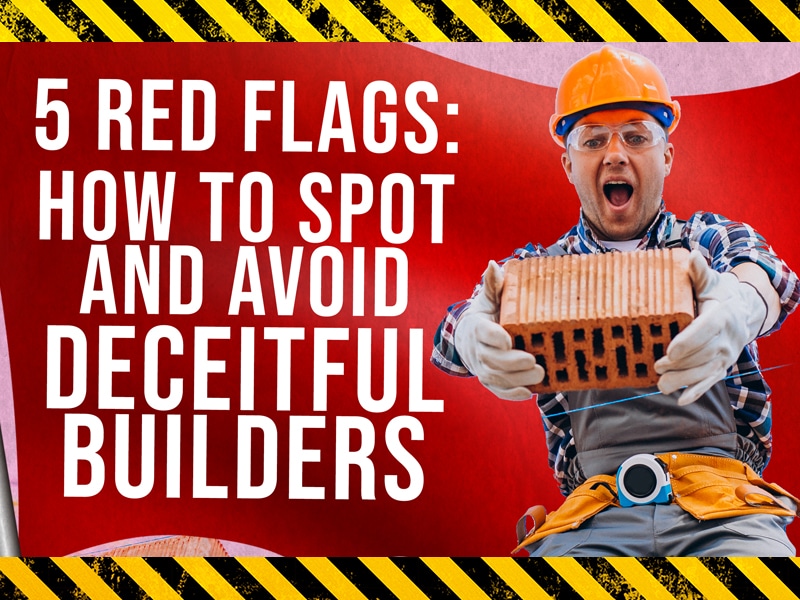5 Red Flags: How to Spot and Avoid Deceitful Builders
Your Beginner’s Guide to Avoiding Disappointments and Cost Blowouts
Choosing the right builder can be a daunting task, especially for those new to construction. It’s a serious decision that requires careful consideration. Not all builders are honest and reliable; some may fail to honor their agreements or even abandon the job midway, leaving homeowners stressed and out of pocket.
While it can be difficult to tell at first glance if a builder is genuine or not, there are clear warning signs to watch out for to avoid falling into their trap. Here are five red flags that indicate you might be dealing with a dishonest builder:
- Too-Good-to-Be-True Offers
Be cautious of heavily discounted prices and “one-time offers.” A builder who is overly eager to provide a quick quote and push you into signing a contract immediately is a big red flag. These builders often surprise clients with additional costs that weren’t included in the original quote, bleeding their clients dry with hidden variations.
If you encounter such offers, take a step back and reassess the situation. A trustworthy builder will not rush you into making decisions. They will take the time to explain all aspects of the project and ensure you understand the terms before construction begins. Transparency is key in a successful builder-client relationship, fostering trust and confidence in the final outcome.
- Doorstep Deals
Beware of builders who show up uninvited at your door with sweet-talking marketing techniques. These builders often claim to be “highly sought after” and make offers that seem too good to pass up. However, well-established builders rarely need to resort to door-to-door sales tactics.
Before agreeing to anything, do your research. Make sure the builder is legitimate by checking their website, visiting their office, and inspecting past and recent projects. Ask for a contact number to speak directly with their management team. And remember, never say “yes” on the first knock!
- Vague Communication
Some builders may use vague language to avoid giving straight answers about the project’s progress. If they respond to your queries with phrases like, “You worry too much. You’re in good hands!” without offering detailed updates, consider this a red flag.
A professional and trustworthy builder will be transparent and straightforward, providing clear updates on the project’s status and addressing any concerns you might have.
- Demanding Large Upfront Payments
Be wary of builders who request large upfront payments before the project has even started. A reputable builder will typically require payments only after specific milestones are completed, not before.
You have the right to refuse large upfront payments, especially if the work has not begun. If you do decide to make a payment, always ask for a receipt to confirm that your payment is officially acknowledged.
- Avoiding Detailed Contracts
A dodgy builder might avoid providing a detailed written contract outlining the scope of work, timelines, costs, and payment schedules. They may try to keep things vague to give themselves flexibility to change terms later on.
Always insist on a detailed contract. It’s your best protection against misunderstandings and unexpected changes. If a builder is hesitant to put things in writing, consider it a significant warning sign.
Avoid Red Flags to Avoid Potential Stresses
By keeping these red flags in mind, you can avoid the stress and financial strain of dealing with a dodgy builder. Always conduct due diligence, stay vigilant, and don’t be afraid to ask questions. For more detailed guidance on selecting the right builder, download our comprehensive eBook today!
Frequently Asked Questions (FAQ)
- What are the first steps to take when choosing a builder?
Start by doing thorough research. Look for builders with a good reputation, positive customer reviews, and a portfolio of completed projects similar to yours. Ask for recommendations from friends or family who have had successful building projects. Also, check if the builder is registered and has valid insurance.
- How can I verify if a builder is legitimate?
Verify a builder’s legitimacy by checking their registration and insurance details. Visit their website, look for client testimonials, and review their previous projects. You can also check with local trade associations to see if the builder is a member. It’s a good idea to ask for references from past clients and follow up with them.
- What should I include in a contract with a builder?
A contract should include a detailed scope of work, project timelines, payment schedules, total costs, materials to be used, and any specific terms agreed upon. It should also cover how changes to the project will be handled and what happens if there are delays. Make sure both parties sign the contract before any work begins.
- How can I spot a builder who might overcharge or demand more money during the project?
Look for signs such as vague quotes, refusal to provide a detailed written contract, or demanding large upfront payments. A builder who frequently changes the scope of work or adds unexpected charges without justification is also a red flag. Always insist on transparency and clear communication.
- Why should I be wary of builders who show up at my doorstep?
Builders who go door-to-door often rely on high-pressure sales tactics and may offer deals that seem too good to be true. These builders might not be well-established, may lack proper insurance or registration, and might be looking to take advantage of unsuspecting homeowners. It’s safer to choose a builder through recommendations or verified platforms.
- Is it normal for a builder to ask for a deposit before starting work?
While it’s common for builders to request a small deposit before starting work, be cautious of those who demand a large percentage of the total cost upfront. A reasonable deposit is typically around 10-15% of the total project cost. Always get a receipt for any payment made and ensure that payment terms are clearly outlined in the contract.
- What should I do if I feel my builder is not being transparent or is avoiding communication?
If your builder is avoiding communication or not providing clear updates, address your concerns directly with them. Document all conversations and requests. If the situation does not improve, consider seeking legal advice or contacting a consumer protection agency for assistance.
- How important is it to check a builder’s previous projects?
Checking a builder’s previous projects is crucial as it gives you insight into their quality of work, reliability, and attention to detail. Visiting past project sites and talking to previous clients can provide valuable feedback and help you decide if the builder is the right fit for your project.
- What are the consequences of hiring a dodgy builder?
Hiring a dodgy builder can lead to incomplete work, poor craftsmanship, unexpected cost blowouts, project delays, and significant stress. In the worst cases, it might result in legal disputes, financial losses, and the need to hire another builder to fix or complete the project.
- How can I find reliable builders?
To find reliable builders, seek recommendations from trusted sources like friends, family, or colleagues who have had successful building projects. You can also look for builders with positive online reviews and memberships in professional associations. Using verified online platforms and directories that list reputable builders can also help ensure you find someone trustworthy.
Ready to avoid costly mistakes and choose the right builder? Book a free call with our team today and get expert advice before you start.

 Magico Constructions
Magico Constructions
